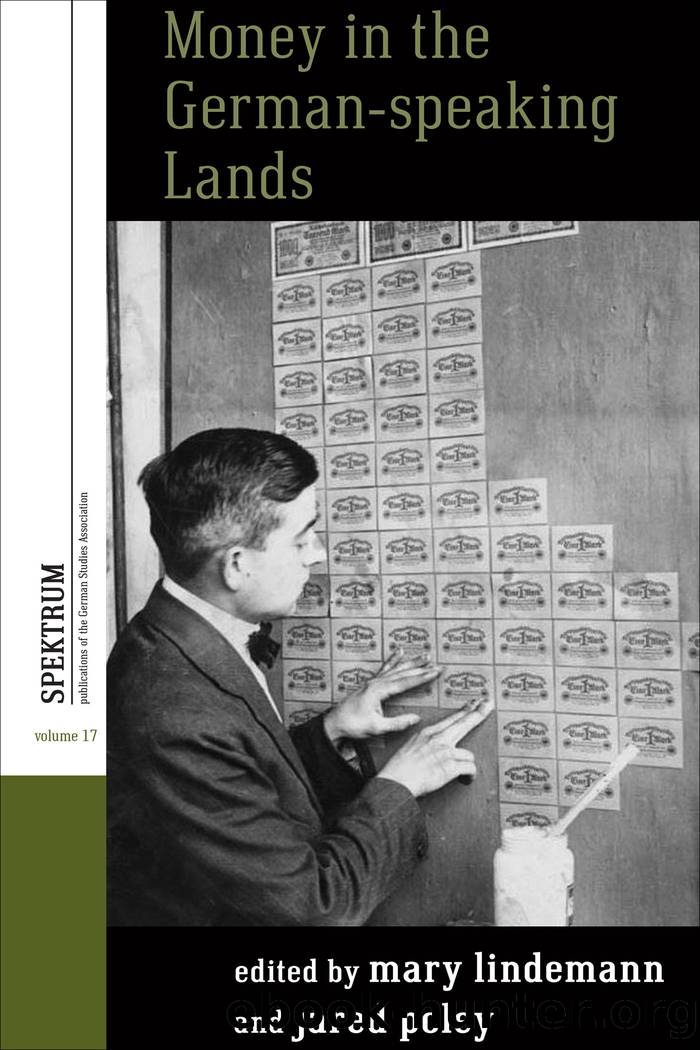Money in the German-speaking Lands by Mary Lindemann & Jared Poley

Author:Mary Lindemann & Jared Poley [Lindemann, Mary & Poley, Jared]
Language: eng
Format: epub
ISBN: 9781785335891
Publisher: Berghahn Books
Published: 2017-05-14T23:00:00+00:00
Luxury and Pauperism
Social reality seemed to speak in favor of pietistic views. If early industrialization enabled some to afford unlimited luxury, it did not prevent its economic downside: pauperism. In spite of technological achievements, the decades before 1850 experienced what historian Heinz-Gerhard Haupt calls âa phase of undernourishment and malnutritionâ in Europe.52 Despite the promise for the future, early industrialization weakened traditional social bonds, worsened working conditions, and could not yet overcome the results of rapid population increase, unemployment, and the poor harvests of the 1840s. Pietists were very much aware of the misery caused by these changes, and many of the Württemberg pastors were actively involved in private charities, orphanages, deaconessesâ homes, and other initiatives of the Inner Mission. Pietists recognized that many families lived considerably below the poverty level. In 1845, Völter, a protagonist of the Württemberg Rettungshaus (orphanage) movement, wrote an article âOn the Causes of the Great Number of Neglected Children in Our Time.â In this article, he warned that the widening gap between the rich and the poor might erupt in a new kind of Peasantsâ War, as it had in the sixteenth century.53
Against this background of great social misery, which some Pietists vividly described, luxury seemed all the more shocking and outrageous. Kapff complained:
Oh, what would have to be told of the harshness towards the poor, the stinginess towards the needy, the accumulation of capital in the face of starving and moaning families, the luxury of all kinds alongside half naked people suffering want?⦠Ten gowns are stored in their cabinet, but they refuse the poor man who asks for one.54
For the Pietists, such displays of luxury within a context of social misery were nothing less than failure to render assistance to those in need. In their view, societyâs wealth was limited; those who took more than their share deprived the rest of their needs. Kapff related the story of a nobleman who had sixteen horses and three carriages, and asks, âHow many of the poor could eat their fill every day if he had kept only four instead of sixteen horses!â55
Kapff did not believe that luxury produced any positive economic effects. Instead, he even regarded it as a cause of the rising number of bankruptcies alongside greed, dishonesty, and stock-market speculation.56 What Sabine Holtz observes for early modern Protestant sermons also applies to the texts of nineteenth-century Württemberg Pietists examined here: none believed that individual self-interest and luxury might serve rather than harm the common good.57 Rather, for Pietists, the damage done by luxury to society and to the individual, was unambiguous. It was even harmful to the rich themselves, as the wealthy, indolent baron in Kapffâs study of the revolution of 1848 realized:
Getting up at 10 oâclock in the morning, drinking coffee, reading the newspaper, having lunch, going for a drive, dinner party in the eveningâthis is my day-to-day routine, and my heart remains empty, and I donât know why Iâm here.
âHow satisfied,â Kapff remarked, âhis heart would become if he worked,
Download
This site does not store any files on its server. We only index and link to content provided by other sites. Please contact the content providers to delete copyright contents if any and email us, we'll remove relevant links or contents immediately.
International Integration of the Brazilian Economy by Elias C. Grivoyannis(111059)
The Radium Girls by Kate Moore(12028)
Turbulence by E. J. Noyes(8051)
Nudge - Improving Decisions about Health, Wealth, and Happiness by Thaler Sunstein(7709)
The Black Swan by Nassim Nicholas Taleb(7130)
Rich Dad Poor Dad by Robert T. Kiyosaki(6633)
Pioneering Portfolio Management by David F. Swensen(6301)
Man-made Catastrophes and Risk Information Concealment by Dmitry Chernov & Didier Sornette(6019)
Zero to One by Peter Thiel(5802)
Secrecy World by Jake Bernstein(4753)
Millionaire: The Philanderer, Gambler, and Duelist Who Invented Modern Finance by Janet Gleeson(4478)
The Age of Surveillance Capitalism by Shoshana Zuboff(4293)
Skin in the Game by Nassim Nicholas Taleb(4250)
The Money Culture by Michael Lewis(4207)
Bullshit Jobs by David Graeber(4192)
Skin in the Game: Hidden Asymmetries in Daily Life by Nassim Nicholas Taleb(4007)
The Dhandho Investor by Mohnish Pabrai(3765)
The Wisdom of Finance by Mihir Desai(3748)
Blockchain Basics by Daniel Drescher(3583)
